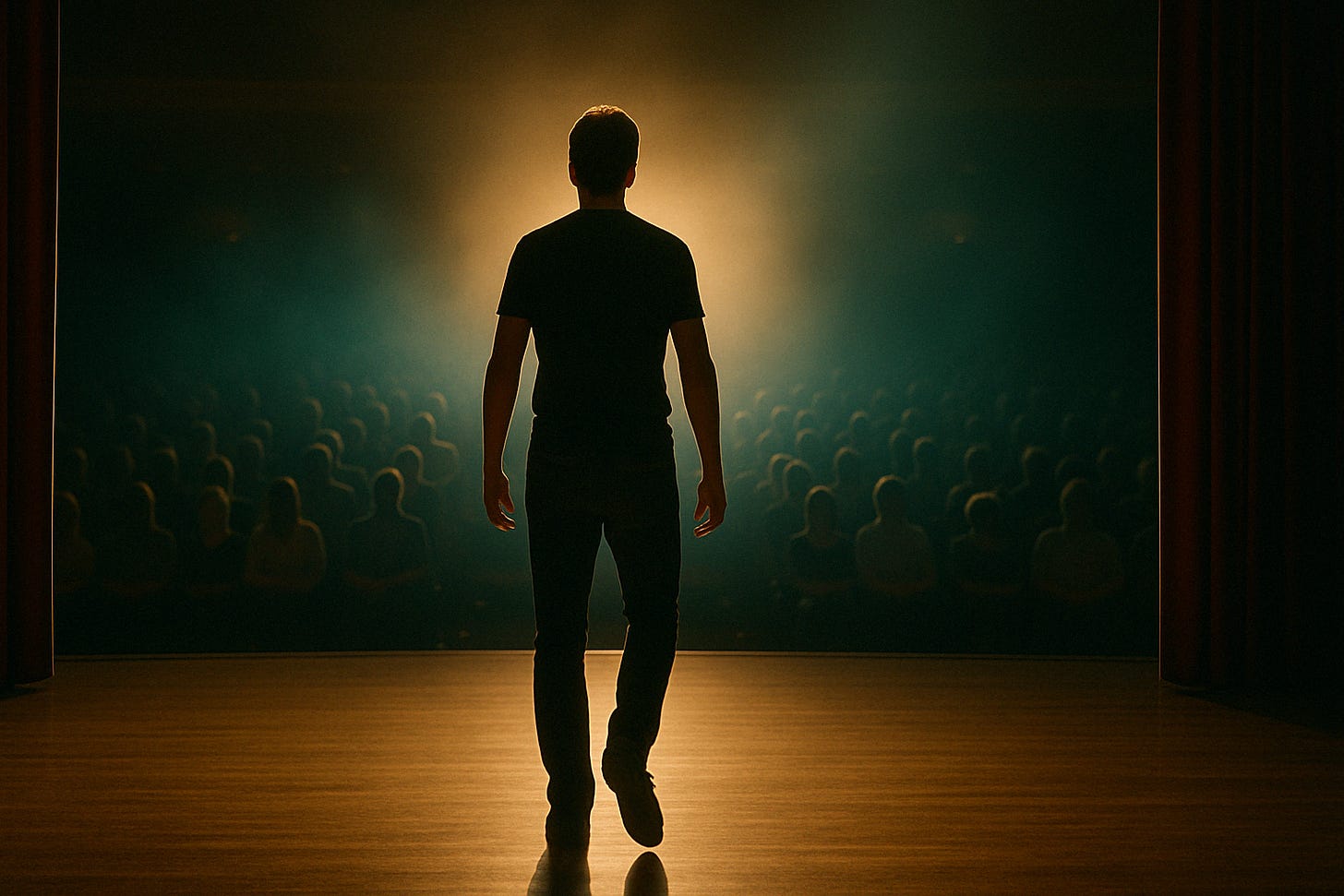Your Fearful Inner Voice is Wrong—Here's How to Ignore It and Start Thriving
What I’ve learned from years of creating and performing despite anxiety and doubt.
Last Saturday, I had an important gig. It had been on the calendar for months, and the pay was better than usual.
The week had been intense, one of those where you get to the weekend with your battery completely drained. I work a lot for my clients, which is good. But it comes at a mental and physical cost.
Meanwhile, my wife's boss is a control freak, perfectionist, and workaholic. When she gets home (always at least an hour late), she's too exhausted even to handle our son, Leonardo. So, I have to pick up the slack.
Last Saturday, I spent the whole day with my head pounding. If I hadn't had such an important commitment, involving other people, I would have canceled and stayed on the couch. But I couldn't disappoint my bandmates or the venue that hired us.
There's just one issue. I'm the singer and lead guitarist of my band. As my drummer says, at least 50% of the success of the show is in my hands.
Bad omens
I spent the morning grocery shopping, tidying up, and preparing lunch—not a single minute to relax. In the afternoon, when my wife and son went out, I literally couldn't stand upright.
I collapsed onto the couch. While staring zombie-like at the screen, my head still pounded.
Then I started hearing a familiar voice: "You won't make it. You'll embarrass yourself." We've played 40 gigs in the last two years. With a small child, catching colds and sore throats around concert days has been inevitable.
Several times, just hours before performing, I questioned whether I'd make it through, if I'd embarrass myself like a clueless wannabe on America's Got Talent, or disappoint everyone with a flat performance.
It's a familiar voice for anyone who puts themselves out there, including all creators. It's always chattering in the background, even when the conditions are favorable. But listening to it is a waste of time and energy.
An expected surprise
The club was an hour away. As I drove, tension growing in my stomach, I warmed up my voice for half an hour (thanks, YouTube!).
When I arrived, my headache fortunately felt less insistent. We set everything up, did the soundcheck, and waited forever. We wouldn't play until 10 PM!
Deep down, worry simmered. Two hours with nothing to do doesn't help distract or calm the nerves. The voice whispered: "When it's finally time, you'll be even more exhausted."
Then the moment arrived. I did my best. I made plenty of mistakes in solos. The audience clapped, but there weren't many.
At the end, I started quickly packing up, eager to get home. Two minutes later, the drummer told me excitedly: "The owner wants us back ASAP."
Another five minutes, a guitarist friend of our bassist, whom I'd never met, approached me directly saying, "Great voice, well done!"
Not bad for a show I would've gladly canceled.
Fear always lies
Two years of gigs have cemented this lesson: the voice of fear doesn't deserve your attention. Never.
I've faced similar situations before, playing shows and rehearsals feeling physically terrible, yet each time the results were surprisingly good, sometimes better than usual.
In those moments, I collected evidence proving that fear always exaggerates, especially with our toughest challenges. This evidence weakens its voice. Still, it always returns. We can't completely eliminate it. It's part of us, trained over years, possibly embedded in our human DNA.
But we can, and must, learn to trust our evidence more than our fears.
When I'm feeling off before a show and doubts creep in, I recall all the times fear was wrong. The voice remains, but my arguments are stronger.
It's the same when you have to press publish, or be a guest on an interview, or launch something new. Trust the evidence from your past.
The essential tool
A creator's career depends on other people's judgment—even just a couple people. Judgment triggers primal fears.
If you're stuck, unable to progress, or even to take the first step, it's because you haven't collected evidence to defuse your fears. You haven't built awareness.
I'll always remember last week's show and the unexpected praise despite my doubts. Just as I recall all similar situations experienced with my band.
How do I do it? Concerts make it easy, they're strong experiences.
But it also helps that after shows, I dictate a recap into my smartphone, noting especially oddities and surprises, and use AI for transcription.
I'm not recommending you to "use AI to increase awareness," but to "find a tool to remind yourself of all the times you've proven your fear wrong." A paper journal is enough.
You need something, no matter what. Otherwise, you'll face fear every time as if for the first time. It'll keep tricking you.
Three lessons to beat creative fears
From this story, I take away three timeless, critical insights:
Fear always lies. It's as creative as we are, inventing countless reasons to stop us.
Fears never vanish entirely. Act despite fear, as each action builds experience.
Evidence is our antidote. Find a way to remember all the times you've succeeded despite fear.
Start now, and you’ll soon be able to overcome the fears that keep you blocked.
What’s your major fear right now? Let me now in the comments.
Subscribe to The Unstoppable Creator to get free articles like this every week. Or upgrade your subscription to get:
📚 Monthly Mini-books to overcome the crucial creator challenges
💬 Community and 1:1 mentoring via chat
🛠️ Monthly templates to make you more productive and unleash your creativity




